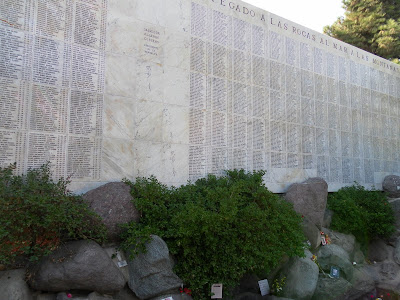Santiago is a typical South American capital city; large, cosmopolitan, rich, poor, polluted. Yet it lacks much of the charm of other Latin American cities, there is very little indigenous presence, and not so much colonial architecture. It is also relatively expensive, e.g. a two hour bus tour costs 18,000 pesos (about £27 or 36 US$). Everything is significantly more expensive than Ecuador, probably around the same level as UK prices. We are staying in the Plaza de Armas Hostel, which is located in the historic centre of the city (an apartment for 3 people is costing US$70 per night). In many other world cities, you just wouldn’t have a hostel in such a location. This place has one of the best ever window views, over the plaza.
 |
| The view from our window in the Plaza de Armas hostel |
In many countries, a location like this in the splendid colonial heart of the city would be highly prestigious. But not in Santiago, the middle classes have moved out of the city and despite its grandeur, the Plaza de Armas is considered a ‘poor’ area.
 |
| View from the Plaza de Armas, the building where the hostel is located is in the background. |
A feature of many Latin American cities is the grand cemeteries. Traditionally, the rich have been represented by huge structures that are often architectural works of art. The accumulation of these in the cemeteries creates bizarre miniature cities, often the most aesthetic features of the cities in general.
 |
| There are hundreds of these structures in Santiago cemetery, laid out out in streets |
I’ve visited similar cemeteries in Havana and Buenos Aires, often off the average tourist’s radar; these are definitely worth a visit. In addition to the vain follies of the rich are large monuments of national significance, often there will be a huge structure, for example, to commemorate firemen who have died protecting the city. In the case of Santiago cemetery, probably the most important of these is the monument to President Salvador Allande and the 2,000 Chilean ‘desaparecidos ‘ (missing). All victims of the right wing dictator Pinochet.
 |
| During Pinochet's presidency around 2,000 Chileans went missing, i.e. were arrested , tortured and murdered by the state security. Margret Thatcher was a friend of Pinochet. |







